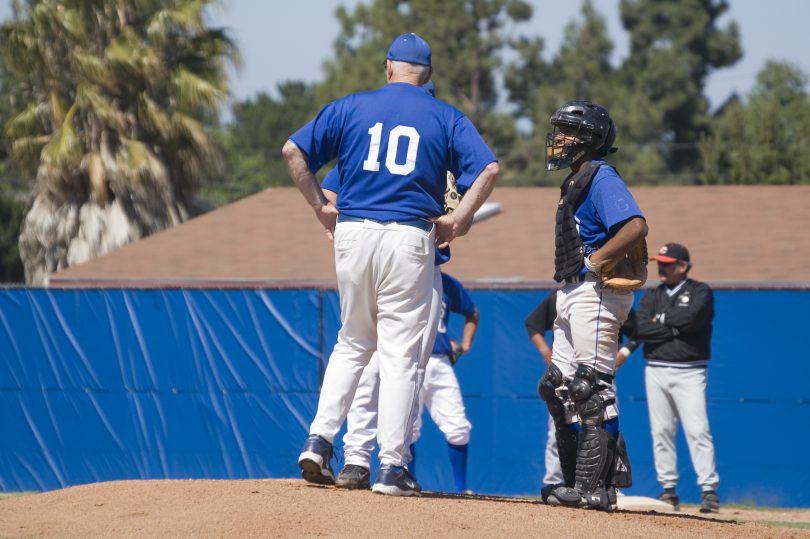No matter what level of competitive baseball you coach, you start your season with the dream of winning your last game. You’ve likely visualized your team having success in the championship game and thought about winning on the biggest stage. You put so much time and effort into the season, preparing your team to have success in the big moment. Yet, when many teams get to the big game they’ve dreamed about, the moment is too big for them. More often than not, teams beat themselves by succumbing to their nerves, losing their composure, compounding mistakes, and simply not doing the things that got them to the big game in the first place.
As a coach, you are the glue that holds your team together. As pressure builds, it’s your temperament, strength, and resolve that will allow your team to play loose and have success. We’ve discussed what it means for a coach to have a winning temperament, and this winning way is on display in these big games. At the high school level, you can often tell who is going win the game simply by looking at the coaches in the dugout. Players under control often reflect a coach who is under control. With your players keying off of you and championships on the line, here are 5 things you can do to earn the reputation as a big game coach and help your team play loose during the big game.
Focus on clear communication, not instruction
When you are in a big game setting, you want your players to have a plan and focus on competing. The last thing you want to have your players thinking about mid-game is mechanical jargon or anything that will cloud their mind. At this point in the season, if your players don’t know what they need to do or what is expected of them, that’s a failure in preparation, and all the last minute instruction in the world isn’t going to help. Make it a point to keep things simple and communicate clearly. “We are going to sac bunt to the right side here,” rather than “We are going to sac bunt to the right side, make sure you get your bat to the top of the zone, keep the barrel up, and bend at the knees.” Give each player a clear job and the confidence to get it done by believing in them and letting them do their thing.
Be a positive voice and presence
Be a positive voice and presence for your players to turn to at all times. Your players will feed off of your body language and actions. If they swing at a pitch above their head, give them a clap and a nod instead of shaking your head and yelling at them to stay in the zone (which they already know). Put positive spin and use affirming language for everything. “Get a good pitch to hit,” rather than, “Don’t chase out of the zone.” Although subtle, the positive focus and presence is a big deal. It’s likely that some player will already feel weighed down by the pressure and expectations of the game. They don’t need the added worry of a negative reaction when they make a mistake. They’ll be hard enough on themselves already. No matter what happens, keep the focus on being a positive presence. Praise the good and encourage through the bad.
Be consistent in your behavior
Be the coach that you have been all season. Consistency is a recipe for success. When players don’t know what to expect from you because your behavior deviates from what it normally is, you can expect that their behavior will be inconsistent as well. If you are a fiery and vocal coach, be a positive fiery and vocal coach. If you are a reserved coach, be yourself, it’s what got you to this point in the first place.
Be the bus driver
As the coach, you are responsible for maintaining control. Have an eye open for emotional moments when things can get out of control quickly. When you recognize these moments unfolding, take the time to help players reset. As the driver, you have your foot on the pedals. There will be times when you need to slow things down (Take a mound visit to calm an infielder down and get him to refocus after an error, call timeout and talk to a hitter to slow down the rhythm of the opposing pitcher, etc.) and times when you need to speed things up (Don’t give signs so the offense can maintain a successful tempo, put on a play to take advantage of the frazzled defense, etc.). You can do a lot to maintain control and give your players the gas or brake that they need.
Trust the training process
At the core of having your team perform well in big moments is having a training process that has prepared them for that moment. If you are reading this the day before your championship game and thinking, “we should have done more of this or more of that,” you know what to work on for next season. If you are reading this knowing that your players are prepared for this moment, trust that training process. When things speed up in the big moments, players will fall back on their training. This is why it’s so important to train at game speed and have elements in training that both slow things down and speed things up. There are no minor details in training, this is really where championships are won, so plan accordingly throughout the season so you can enjoy the ride once you get there.
There are many things that you can do as a coach during a big game to keep your team playing loose and playing the brand of baseball that got you to the big moment. These 5 suggestions offer some insight, but it all starts with a consistent and positive temperament and training in a way that will make the pressure filled moments feel routine. If you want your team to stay under control in the big moment, you must stay under control yourself. Lead by example, keep things simple, stay positive, and enjoy the big stage!







